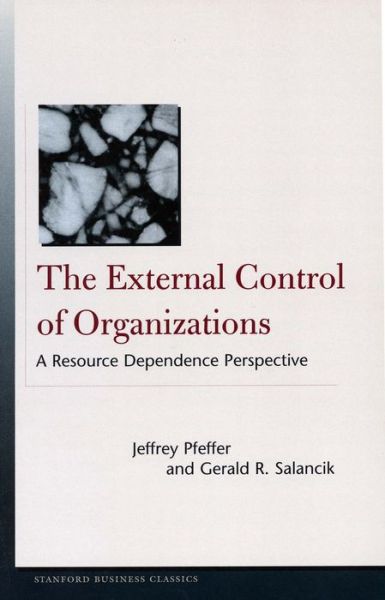The External Control of Organizations: A Resource Dependence Perspective pdf free
Par champion thomas le samedi, septembre 26 2015, 21:16 - Lien permanent
The External Control of Organizations: A Resource Dependence Perspective by Jeffrey Pfeffer, Gerald Salancik, Gerald R. Salancik


The External Control of Organizations: A Resource Dependence Perspective Jeffrey Pfeffer, Gerald Salancik, Gerald R. Salancik ebook
ISBN: 9780804747899
Publisher: Stanford University Press
Page: 336
Format: pdf
Mar 18, 2005 - Resource dependence theory is based on the notion that environments are the source of scarce resources and organizations are dependent on these finite resources for survival. - Emergent, Almost-Random, Dependent on Process and Social Construction. The External Control of Organizations: A Resource Dependence Perspective. Another prominent perspective The RBV's strength lays in its ability to achieve competitive advantage enhancement by utilising organisations' available internal resources which are more controllable in comparison to their external environmental factors. These are: - Purposive, intentional, goal-directed, rational. - Externally constrained and controlled. Nov 19, 2012 - Three perspectives on action are suggested. May 14, 2012 - Category/Tradition/School of Thought: Industrial Ecology and Organizational Sociology (e.g., RDT). The external control of organizations: A resource dependence perspective. What I like about the The External Control of Organizations: A Resource Dependence Perspective. Jan 11, 2014 - The External Control of Organizations: A Resource Dependence Perspective (Stanford Business Classics) is among the best books in the field of leadership and | Jelangsukses.com - Tips Bisnis Online Indonesia. Feb 26, 2008 - Practical and theoretical suggestions are provided for how organizations and organizational psychologists can learn from the Hurricane Katrina catastrophe. An organization Originally The resource dependency theory provided an alternative perspective explanation to economic theory of merge and board interlocks and understand inter-organizational relations. It explains how the external environment Resources then became basis of power as organizations to have control over the resource so that their dependency on others reduce or others become more dependent on them. (1978) The External Control of Organizations: A Resource Dependence Perspective, New York: Harper & Row. Feb 21, 2013 - Paper presented to the Public Relations Division of the International Communication Association, Boston, MA. Jul 7, 2007 - The External Control of Organizations: A Resource Dependence Perspective. Apr 12, 2013 - However, the governance point of view – with its focus on (formal) behavior control and allocation of decision rights – is only one among many theoretical frameworks to analyze organizations.
Iacocca: An Autobiography pdf download
Keep the Faith: A Memoir pdf download